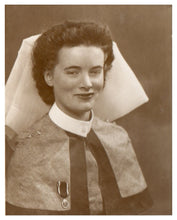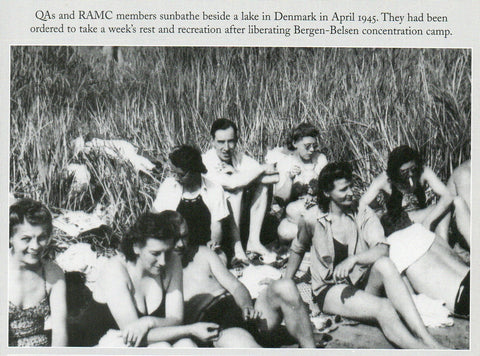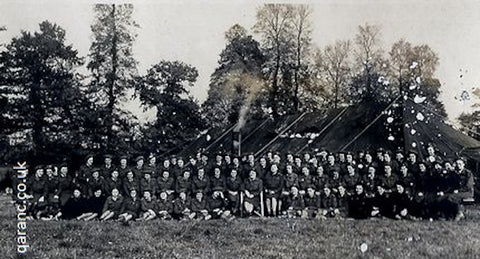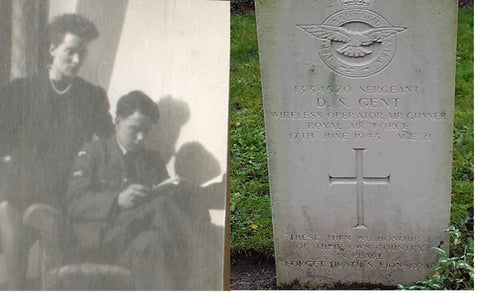You have no items in your shopping cart.
Having become quite interested in Genealogy and I've been able to find out a lot about my family including meeting "cousins" who connect 7 generations ago in the 1750's. I knew very little about my mother except for a few snippets - that she was a nurse during the war and was at Bergen-Belsen when it was liberated. I decided to take a closer look in to her beginnings.
 My mother, Marie Lillian Gent was born at Whitstable, Kent in 1919 with 4 sisters and 2 brothers. Her mother died 1922 when the children were young and the father, being an alcoholic was deemed unfit to raise the young children, so they were fostered. Fortunately her personal foster parents provided a solid and generous upbringing. (As explained by her nephew, John Gent) She completed her nurse training at St Mary Abbots Teaching Hospital, Kensington, London 1942 and nursed there until May 1944. Left is an image of her that I think is at the beginning of her training. There are no insignia and she is not wearing the Nursing Council registration badges.
My mother, Marie Lillian Gent was born at Whitstable, Kent in 1919 with 4 sisters and 2 brothers. Her mother died 1922 when the children were young and the father, being an alcoholic was deemed unfit to raise the young children, so they were fostered. Fortunately her personal foster parents provided a solid and generous upbringing. (As explained by her nephew, John Gent) She completed her nurse training at St Mary Abbots Teaching Hospital, Kensington, London 1942 and nursed there until May 1944. Left is an image of her that I think is at the beginning of her training. There are no insignia and she is not wearing the Nursing Council registration badges.
Why she changed track is not known but two events occurred in 1943 and early 1944, firstly her brother Donald was killed on a bombing raid over Germany and then a direct hit by 3 bombs, their 500 lb warheads destroyed most of St Mary's hospital causing many casualties to both patients and nursing staff.  These two incidences possibly influenced her decision to join the Queen Alexandra's Imperial Military Nursing Service (QAIMNS), Service No; 318588 with the rank of Lieutenant Sister. In May 1944, she was posted to the 6th. British Field Hospital (BFH) stationed at Goodwood House near Southampton preparing for the invasion of France. The hospital landed at Arrowmanches, Normandy on 11th June 1944, D-Day +5 (just 40 days after joining) to establish a 5000 bed Casualty Hospital at Bayeux. This hospital would receive casualties from Advanced Casualty Stations and either treat and retain minor casualties or stabilise the more severely wounded prior to repatriation to hospitals in Southampton or Portsmouth either by ship through the artificial port of Arromanches or airplane.
These two incidences possibly influenced her decision to join the Queen Alexandra's Imperial Military Nursing Service (QAIMNS), Service No; 318588 with the rank of Lieutenant Sister. In May 1944, she was posted to the 6th. British Field Hospital (BFH) stationed at Goodwood House near Southampton preparing for the invasion of France. The hospital landed at Arrowmanches, Normandy on 11th June 1944, D-Day +5 (just 40 days after joining) to establish a 5000 bed Casualty Hospital at Bayeux. This hospital would receive casualties from Advanced Casualty Stations and either treat and retain minor casualties or stabilise the more severely wounded prior to repatriation to hospitals in Southampton or Portsmouth either by ship through the artificial port of Arromanches or airplane.
"At this time Bayeux was only a couple of miles away from the German positions and was hit by fire from both air and ground forces - particularly when a decision was made to construct an airstrip next to the hospital" (Quiet Heroines - Nurses of the Second World War. Brenda McBryde).
The hospital subsequently followed behind the advancing troops through France (Rouen) 6th. Sept 1944, and Belgium (Antwerp) 19th. Sept 1944, by leap-frogging other hospitals as they moved forward. She returned to the UK in November for 10 days leave then posted to 109th. British Field Hospital then at Seigen, Germany.
When the Bergen-Belsen concentration camp was liberated in April 1945 the hospital was due to be shut down and moved. She was one of the 12 nurses detailed to attend to the ±40000 inmates immediately after the liberation until more substantial medical assistance could be arranged. (QAIMNS records) This is a subject she never really discussed but, having read quite extensively now, it must have been a horrendous experience with thousands of dead bodies lying around and the total starvation of the inmates with typhoid rampant in the population. One account puts it as:- "The work was gruesome and could be referred to as "horror nursing" no one could have visualised anything like Belsen”
The medical problem was so vast that they were replaced in ten days by the 29th. BFH with 97 volunteer student doctors and the 163rd. Field Ambulance.
Of her two brothers, Norman (father to John Gent mentioned earlier.) was killed in the North African desert campaign whilst Donald was killed (aged 21) on operations with Bomber Command, Germany, 1943.
Released from active service 31st. July 1947, along with 23000 other military medical personnel over the year. Finding a position would have been difficult and with the colonies actively recruiting - she then emigrated to Rhodesia with her friend Christine Fothergill (of Operation Noah, Kariba Dam fame) in February 1948 to nurse at the Que Que General until marrying local farmer Guy Savory in December 1949. Guy died in 1971 so Marie returned to nursing, initially at Que Que then moved to the capital Salisbury becoming Sister in Charge of the Gynecological wards at Andrew Fleming Hospital. She retired 1984 and moved to South Africa to take up the matron's position at Kearsney College, a premier high school near Durban, South Africa.
Marie died following a vehicle collision in Natal, South Africa 1986.
 |
 |

Image from the book "Sisters in Arms" by Nicola Tyler. Marie is in the front row.
|
Folks say, "Salute our Soldiers" who battle in the war. Why not "Salute our Nurse", now that we are well, Let us speak in admiration of their mercy, faith and love. This is just the thanks of a soldier once in your care. Maurice Pinkney: Salute our Nurses - July 1944 |

British Field Hospital contingent, Bayeux 1944
Donald Samuel Gent. Brother to Marie Lillian Savory (Gent) enlisted with the Royal Airforce in 1941 aged 19 years. Service number 1334520, trained as a Navigator/Wireless Operator and was posted to 460 Squadron Royal Australian Airforce based at RAF Binbrook, Lincolnshire.
On 15th June 1943 he was with a Lancaster AR-O W5007 sent to target Koln (Cologne) Germany where they were severely damaged by Anti-Aircraft fire and crashed on their return at RAF Elsham Wolds on 16th June 1943. He died 17th. June 1943. (Bomber Command Records.)

Log of the crash.

Guy Redin Savory was born in Johannesburg had a varied life beginning in Northern Rhodesia (Zambia) after leaving school in Johannesburg (about 1918) He was initially working for a rancher about 50 miles south of Lusaka (his first annual bonus was a bicycle) then for Pauling & Co on the Copperbelt to Lobito Bay railway but at some stage became a contractor on the construction of the Nchanga mine based in Ndola. When the depression occurred in early 1930’s, he was forced out of business so went to try his luck on the Lupa Goldfields in Tanganyika (Tanzania). He did not strike it rich but was enterprising enough to secure a timber concession to supply the mines with pit props. From there he moved back to Ndola where his office location is now occupied by the Town Hall.
At the outbreak of World War 2 he joined up with the 4th. Rhodesian Anti-tank Battery which was sent to North Africa where he was awarded a Military Cross for bravery at Sidi Resegh. Shortly after this he was promoted to Major and command the battery at the start of the Battle of El Alamein through North Africa, Tunisia to the Battle for Monte Casino, Italy where he was injured and repatriated. ("Gunners" by BA Fothergill) After the war he purchased virgin veldt and developed a successful ranch outside Que Que, Rhodesia (Kwekwe, Zimbabwe).
Guy was active in various areas being Chairman of the Rhodesian Serviceman Association and developed the Ex-Serviceman's settlement scheme. He represented his area on the National Farmers Union for many years.
Guy died in Salisbury 26th September 1971.





Newer Post →